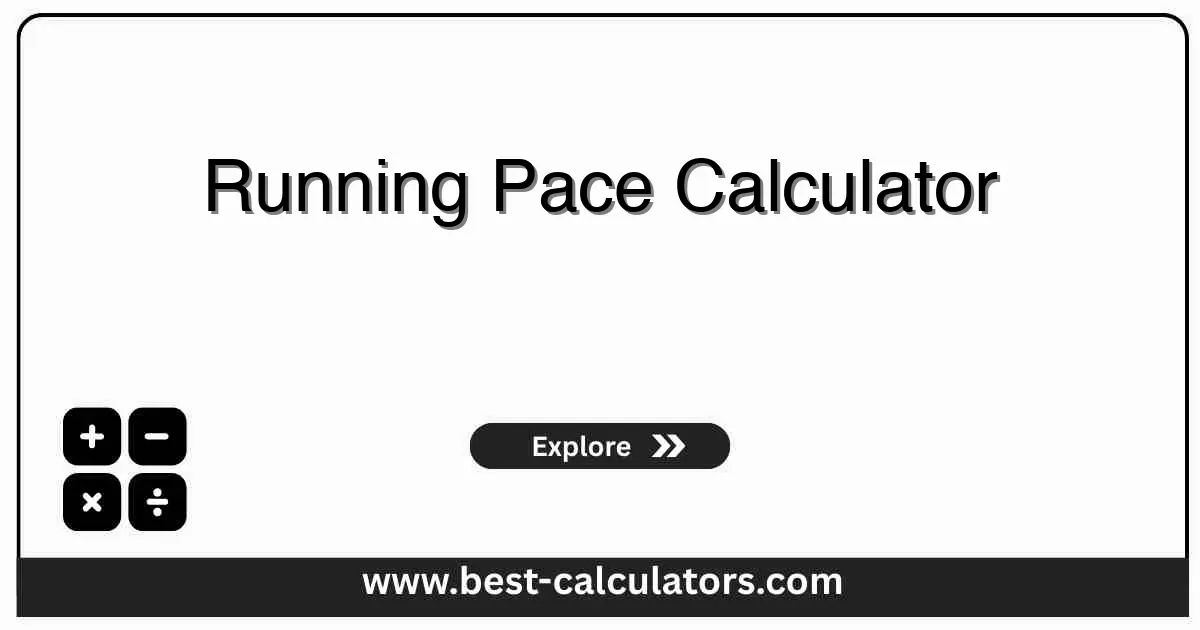Running Pace Calculator - Calculate Your Running Time and Distance
Calculate your running pace, time, or distance to plan your workouts and track your performance
Running Pace Calculator
Your Running Results
* Calorie estimation is approximate and varies by individual factors such as running efficiency, terrain, and conditions.
What is Running Pace?
Running pace is the time it takes to run a specific distance, typically measured as minutes per kilometer or minutes per mile. It's a fundamental metric for runners to track performance and plan workouts.
Common pace categories:
- Walk - 15:00+ min/km (24:00+ min/mi)
- Beginner - 9:00-12:00 min/km (14:30-19:30 min/mi)
- Intermediate - 6:00-9:00 min/km (9:30-14:30 min/mi)
- Advanced - 5:00-6:00 min/km (8:00-9:30 min/mi)
- Elite - Under 5:00 min/km (Under 8:00 min/mi)
How Running Pace Calculator Works
The calculator uses these formulas:
Our calculator works for both metric (kilometers) and imperial (miles) units, converting between them as needed.
Understanding Running Metrics
Pace vs. Speed
Pace measures time per distance, while speed measures distance per time. They're inversely related.
Training Zones
Different paces target different energy systems for specific training adaptations.
How to Use This Running Pace Calculator
Choose Units
Select metric (km) or imperial (mi) units
Enter Known Values
Input any two of distance, time, or pace
Leave One Blank
Leave the unknown value blank to calculate it
Get Results
View all running metrics and performance data
Benefits of Tracking Your Running Pace
- • Training Planning: Set appropriate paces for different workout types.
- • Performance Tracking: Monitor improvements in your running efficiency.
- • Race Strategy: Determine pacing for upcoming races and events.
- • Injury Prevention: Avoid overtraining by maintaining appropriate paces.
Factors That Affect Your Running Pace
1. Fitness Level
Your cardiovascular fitness and running experience significantly impact your pace.
2. Terrain
Uphill running slows pace, while downhill can increase it.
3. Weather Conditions
Heat, humidity, and wind resistance can significantly affect running pace.

Frequently Asked Questions (FAQ)
Q: What is a good running pace for beginners?
A: Beginners typically start with a pace between 12-15 minutes per mile (8-10 minutes per kilometer). It's important to start slow and gradually increase your pace as your fitness improves.
Q: How can I improve my running pace?
A: To improve your running pace, incorporate interval training, tempo runs, and long slow runs into your routine. Focus on consistency, proper nutrition, and adequate rest for optimal results.
Q: What's the difference between pace and speed?
A: Pace measures how much time it takes to cover a unit of distance (e.g., minutes per mile), while speed measures how much distance is covered in a unit of time (e.g., miles per hour). They are inversely related.
Q: How accurate is pace calculation for running?
A: Our calculator provides precise mathematical calculations. However, actual running pace can vary based on terrain, weather conditions, fitness level, and other factors. The calculator gives you a baseline for planning.